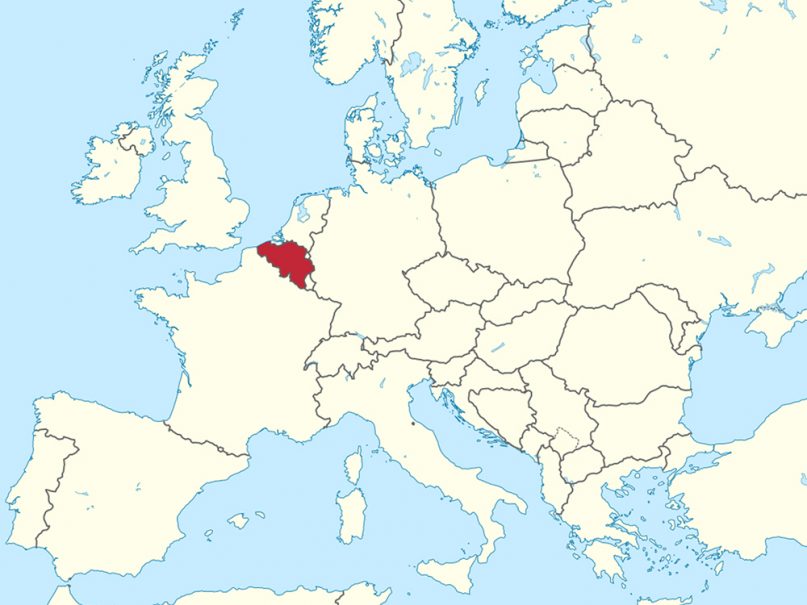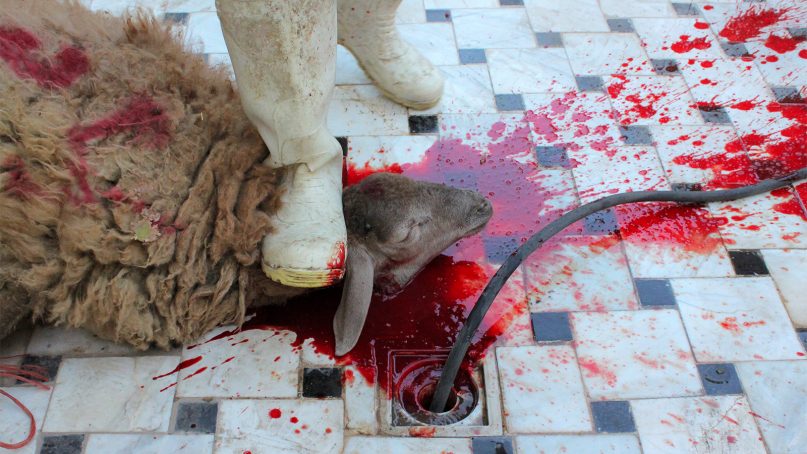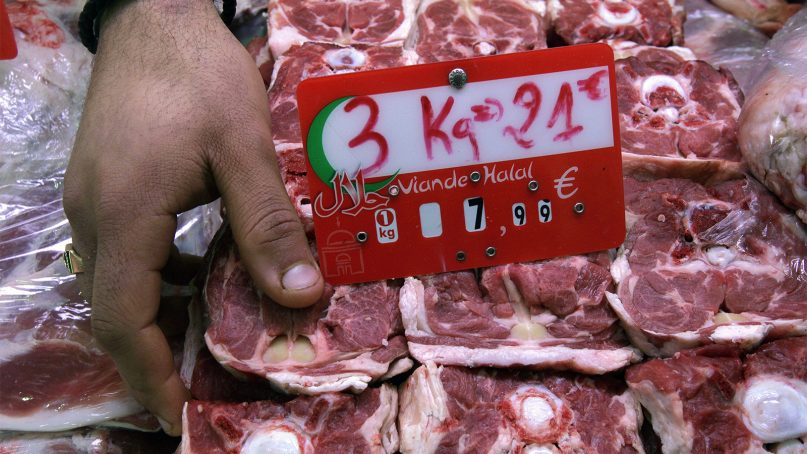PARIS (RNS) — Jewish and Muslim communities in Belgium are seeking to overturn a recent ban on the ritual slaughter of animals that they say is really discrimination cloaked in an animal protection mantle.
More than 50 religious groups have lodged complaints with the country’s Constitutional Court in the hope of repealing the new legislation, which went into effect New Year’s Day. The court is expected to rule within the next two months.
Opponents of the ban say it is not based on science.
“It’s a decision that threatens freedom of religion because ritual slaughter is part of our religion,” said Albert Guigui, Brussels’ chief rabbi. “We find it’s unjust and unjustifiable since there’s no proof that ritual slaughter causes more suffering than standard slaughter. On the other hand, pre-stunning is not always effective, causing animals to remain conscious during slaughter.”
The Muslim halal and Jewish kosher rituals require that animals should be in perfect health when they are slaughtered by having their throats slit and their blood drained. Under a new law, animals will have to be rendered unconscious — or stunned — before being killed, a method that animal rights advocates argue is more humane.
The law prohibiting animal slaughter without stunning was approved by the Belgian Parliament in July 2017. The northern region of Flanders, where one of the largest ultra-Orthodox Jewish communities in Europe is centered around the city of Antwerp, was the first to implement the ban.
The southern French-speaking Wallonia region will put similar restrictions in place in September. By the end of the year only the Brussels region, home to a sizable Muslim community, will continue to allow slaughter methods without pre-stunning.

Belgium, red, is in western Europe. Map courtesy of Creative Commons
About 30,000 Jews and 500,000 Muslims are estimated to live in Belgium, out of a total population of 11 million. Apart from their concerns about religious freedom, they fear the ban will increase food prices because halal and kosher meat will have to be brought in from other countries. The new legislation does not prevent such meat from being imported.
“Kosher meat is normally more expensive than standard meat because it has to be prepared according to strict rules. Now there will be even more complications that will push its price up,” said Guigui. “It will also have a wider economic impact because butchers and abattoirs will have to close down.”
Animal rights groups say that the practice of slaughtering animals without stunning is inhumane and that their support for the ban is motivated by concerns over animal welfare rather than religious discrimination.
“It’s never been an issue of banning religious slaughter but a question of animal welfare. If there is a technology that prevents sentient beings from suffering unnecessarily, then it should be applied,” said Michel Vandenbosch, president of the Belgium-based animal welfare group Global Action in the Interest of Animals.
“It can take several minutes before a cow that has had its throat slit becomes unconscious. This means several minutes of extreme suffering,” he added.
The introduction of the ban coincides with growing tensions across Europe over the balance between animal welfare and religious freedom.
Although European Union laws require animals to be incapable of feeling pain when they are killed, several European countries offer religious exemptions that allow halal and kosher meat. Others, such as Norway, Sweden and Slovenia, do not.

A halal ritual slaughter, known as dhabihah or zabiha in Islamic law, of a sheep. Photo by Mostafa Meraji/Creative Commons
However, in recent years there’s been a trend toward removing these exemptions. In 2014, Denmark instituted a ban on the ritual slaughter of animals without pre-stunning.
Currently, Jews in Denmark import their kosher meat. Danish Muslim leaders, however, say their community isn’t as affected by the new rule because Islam allows for pre-stunning in ritual slaughter.
Meanwhile, the Jewish community has vowed to overturn the ban, instituted by ministerial decree, saying that it was a symbolic measure against its community as the ritual slaughter had not been performed in Denmark for many years.
“There was no debate, no evidence, no reasoning behind it,” said Jair Melchior, chief rabbi of the Jewish community of Denmark. “We will continue to fight this.”
Danish officials said the country has long had restrictive rules concerning the ritual slaughter of animals and the only change was to remove the exception.
The European Union — of which Denmark is a member — requires pre-stunning. However, the bloc’s rules allow for exemptions on religious grounds according to a ruling by the European Court of Justice a decade ago.
As these exemptions are being phased out in some countries, Jews and Muslims say their communities are being targeted and used to score political points as the power of right-wing populists — who often use anti-Muslim, anti-immigrant rhetoric — continues to rise.
For example, the legislation in Belgium was initially proposed by the state of Flanders’ animal welfare minister Ben Weyts, a right-wing Flemish nationalist.
Minority groups wonder what other rights they will lose, pointing to attempts to ban circumcision in Germany and Denmark over the past few years, which would mainly affect Jews and Muslims.
“The Muslim community is now threatened by laws that are hostile to freedom,” said the Muslim Executive of Belgium, the official Muslim interlocutor of the Belgian federal government that is part of the lawsuit against the ban. “We expect a repeal of these laws in Flanders and Wallonia, which completely contradict our constitution and the European Convention on Human Rights.”
(Bhatti reported from Berlin.)





